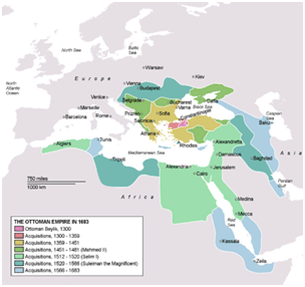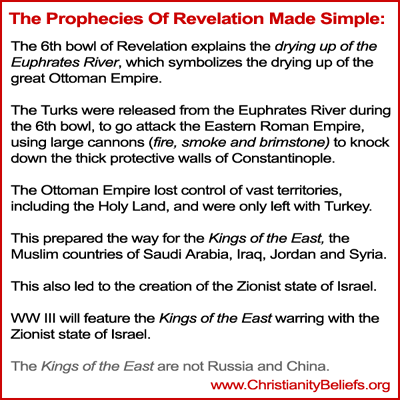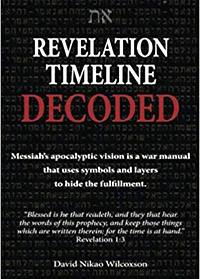The Sixth Bowl Of Revelation 16
This Revelation Timeline Decoded Bible study focuses on the drying up of the Euphrates River in the 6th bowl of Revelation 16.
Summary: The 6th Bowl was poured out to dry up the Ottoman Empire, the people (river) of the Euphrates who had been released during the 6th Trumpet of Revelation 9. During the 18th and 19th centuries, they lost control of the territories that they had occupied. They lost control of Palestine to General Allenby of Great Britain in 1917 A.D. And were only left with the country of Turkey.
Revelation 16:12-16, Then the sixth angel poured out his bowl on the great river Euphrates, and its water was dried up, so that the way of the kings from the east might be prepared.
The meaning of the sixth vial is determined by that of the sixth trumpet. Under the “woe” of the sixth trumpet, a destroying army, vast in numbers, issued from the River Euphrates as a judgment on idolatrous christendom.
With one consent historical interpreters have recognized the fulfillment of this “woe,” in the overthrow of the Eastern Roman Empire by the Turks, whose myriads of horsemen came from the banks of the Euphrates.
The sixth trumpet of Revelation 9 represents the Turks, who became the great Ottoman Empire, being released from the Euphrates River to go attack the Eastern Roman Empire. The Ottoman Empire conquered a vast amount of territory.
Hence the drying-up of the Euphrates which takes place under the sixth vial, has long been interpreted to mean a wasting away, or notable diminution of Turkish power; involving the decline of its population, and the loss of its territories.

The initial date of the modern drying up, or exhaustion of the Turkish Empire, was that of the Greek insurrection in 1821.
A formidable insurrection against the Turkish power began in Greece, which quickly spread to Wallachia, Moldavia, and the Aegean isles.
In 1826 Turkey was obliged to surrender to Russia all its fortresses in Asia.
Before a fresh army matured, Russia again attacked the Turkish Empire, and backed up by England and France, secured the independence of Greece, after the great naval battle of Navarino, in which the Ottoman fleet was totally destroyed.
The large Turkish province of Algeria in North Africa was lost to the Sublime Porte, and became a French colony in the following year.
In 1832 Turkey was brought to the verge of dissolution in consequence of the successful rebellion of the powerful pasha of Egypt, Mehemet Ali.
He attacked and conquered Syria, and defeated the Turkish armies in three great battles, and he would have taken Constantinople had not the western nations intervened.
The Turks lost control of the Middle East, which paved the way for the formation of the ‘kings of the east’.
In 1932, Saudi Arabia, officially known as the Kingdom of Saudi Arabia, was founded.
The Kingdom of Iraq was founded on 23 August 1921 under British administration following the defeat of the Ottoman Empire in the Mesopotamian campaign of WWI.
The Proclamation of Arab Kingdom of Syria took place on March 1920.
After the post–World War I division of West Asia by Britain and France, the Emirate of Transjordan was officially recognized by the Council of the League of Nations in 1922. In 1946, Jordan became an independent sovereign state officially known as the Hashemite Kingdom of Transjordan. After capturing the West Bank during the 1948 Arab–Israeli War, Abdullah I took the title King of Jordan. The name of the state was changed to The Hashemite Kingdom of Jordan on 1 December 1948
The Anglo-Ottoman Convention of 1913 (29 July 1913) was an agreement between the Ottoman Porte and the British Government defining the limits of Ottoman jurisdiction in the area of the Persian Gulf with respect to Kuwait, Qatar, Bahrain (officially the Kingdom of Bahrain), and the Shatt al-‘Arab.
The Ottoman Empire lost control of Palestine to General Allenby of Great Britain in 1917.
The Battle of Jerusalem occurred during the British Empire’s “Jerusalem Operations” against the Ottoman Empire, when fighting for the city developed from 17 November, continuing after the surrender until 30 December 1917, to secure the final objective of the Southern Palestine Offensive during the Sinai and Palestine Campaign of World War I. https://en.wikipedia.org/wiki/Battle_of_Jerusalem
All that the Ottoman Empire was left with was the country of Turkey.
On November 1, 1922, the newly founded parliament formally abolished the Sultanate, thus ending 623 years of Ottoman rule. The Treaty of Lausanne of July 24, 1923, led to the international recognition of the sovereignty of the newly formed “Republic of Turkey” as the successor state of the Ottoman Empire.
Here is a video about the establishment of Zionist Israel.
References:
The 7 Vials of Revelation by Graeme Hotter
Albert Barnes’ Notes on the Bible Revelation 16:
The People’s New Testament Commentary – Revelation 16
History Unveiling Prophecy by Henry Grattan Guinness
The Present Reign of Jesus Christ by Robert Caringola. p 222-223
https://en.wikipedia.org/wiki/Decline_and_modernization_of_the_Ottoman_Empire
https://en.wikipedia.org/wiki/History_of_Turkey
Next Revelation Timeline Decoded Bible Study: Revelation 16 – Three Unclean Spirits
Here’s an image to share with others on Facebook and other social media sites, to help them understand the fulfillment of the 6th Bowl of Revelation:




